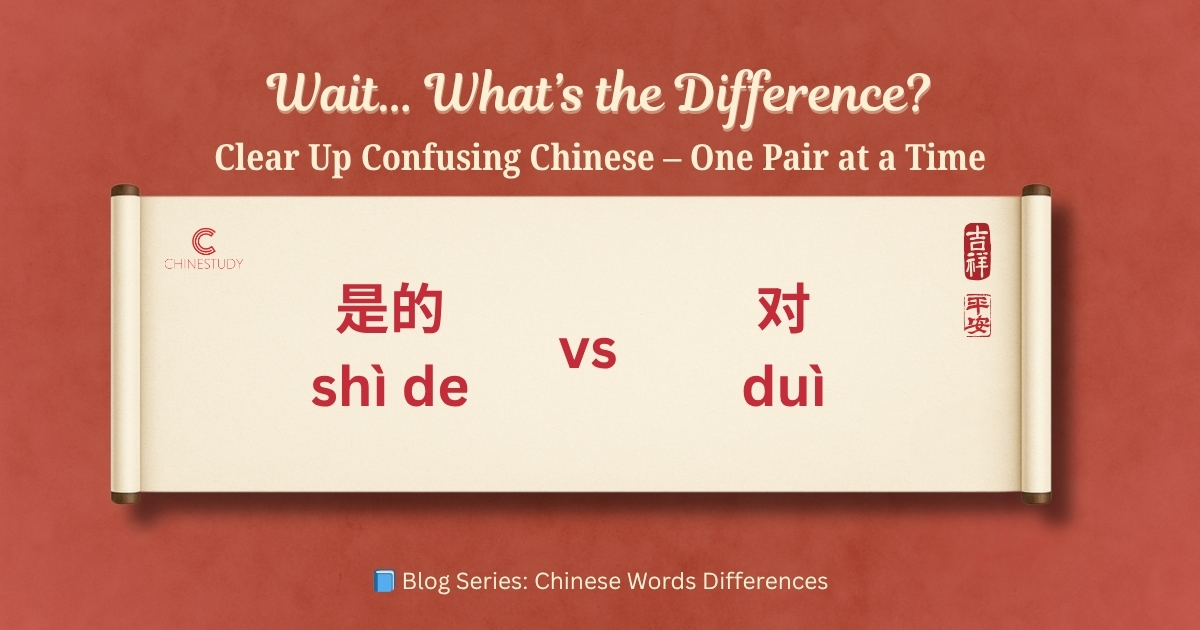🗣 是的 shì de vs 对 duì – What’s the Difference?

Both 是的 shì de and 对 duì can mean “yes” — but they don’t always feel the same. 🧐
Good news? They’re often interchangeable. Better news? You’re about to learn when to use which — with examples and a fun quiz at the end!
🔍 Breakdown
🟡 是的 (shì de) – “Yes, it is.”
- Polite and complete
- Used to confirm a fact
- Sounds more formal, thoughtful, or respectful
📌 Often used in:
- Full answers
- Formal conversations
- When you want to sound polite
🟢 对 (duì) – “Yes” / “Right”
- Casual and quick
- Used to confirm someone’s opinion or feeling.
- Sounds more relaxed or everyday
📌 Often used in:
- Quick replies
- Friendly chats
- Confirming somebody is right
💬 Easy Examples
🟢 They can both work!
Example 1:
- 明天是星期五吗?
(Míngtiān shì xīngqīwǔ ma?)
→ Is tomorrow Friday?
✔ A: 是的。Shì de。
👉 More standard and a bit formal, confirming the fact itself.
✔ A: 对。Duì。
👉 More casual and quick, confirming that what the other person said is correct.
Example 2:
- 学习中文需要多练习。
(Xuéxí Zhōngwén xūyào duō liànxí.)
→ Learning Chinese requires lots of practice.
✔ A: 是的。Shì de。
👉 Agreeing with a fact or statement.
✔ A: 对。Duì。
👉 Emphasizing agreement with the speaker’s opinion or feeling.
Example 3:
- 你昨天去图书馆了,是吧?
(Nǐ zuótiān qù túshūguǎn le, shì ba?)
→ You went to the library yesterday, right?
✔ A: 是的。Shì de。
👉 Clearly confirms the info is correct.
✔ A: 对。Duì。
👉 Quickly confirms the speaker’s assumption.
🎯 Try It Yourself!
Answer the questions with 是的 shì de or 对 duì.
1. 他是你哥哥吗?
(Tā shì nǐ gēge ma?)
👉 Is he your older brother?
✅ Correct answer: Both work!
📝 是的 is confirming the fact itself.
对 is confirming what the other person said is correct.
2. 你昨天去看电影了,是吧?
(Nǐ zuótiān qù kàndiànyǐng le, shì ba?)
→ You went to see a movie yesterday, right?
✅ Correct answer: Both work!
📝 是的 clearly confirms the information is accurate.
对 quickly confirms the speaker’s assumption.
🚀 Final Tip
- 📌 是的 (shìde) is more formal and confirms a fact.
- 📌 对 (duì) is more casual and agrees with someone’s opinion or feeling.
🎯 Try answering simple yes/no questions using both words — and notice the difference in tone!
Just one word can flip your meaning — don’t miss the rest of the series! 👉 check them out here! 😄📘
Thank you for subscribing!
Have a great day!